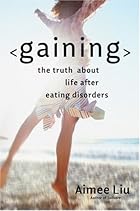 First and foremost- do not assume that the book jacket cover photography portrays the content inside. (What's the cliche I'm looking for? Oh, that's right... "Never judge a book by its cover!")
First and foremost- do not assume that the book jacket cover photography portrays the content inside. (What's the cliche I'm looking for? Oh, that's right... "Never judge a book by its cover!") "Gaining: The Truth About Life After Eating Disorders" by Aimee Liu is deep, and occasionally dark, unlike what the artwork might suggest. After two weeks of struggling to read 2/3 of this book, I had to return it to the library. It's definitely some very dense reading material, and is definitely geared more towards those who have struggled for years with disordered eating and eating disorders in their adolescence and young adulthood (only to find that, despite perhaps learning how to semi-function in their 20s-30s or older, they still exist with distorted views of themselves and/or their eating patterns).
I found myself truly relating to the novel research and studies Liu writes about, as well as the countless accounts of fellow eating disordered men and women. Two things really shocked me: 1) She interviewed Dr Michael Strober from the UCLA Eating Disorders program, who was my psychiatrist while in residential treatment at a different facility in the Southern California area (and who I found utterly impossible to relate to, as he came off as a total "know-it-all"), and 2) Liu tells the story of a man from Bakersfield, CA (where I live and grew up)! It was just neat to read that someone ELSE has the courage to talk about eating disorders in Kern County, of which Bakersfield is the "seat."
Yeah, it was a tough read. It was a mind-frying read. It was a slightly disappointing read (since she didn't really delve into how the people she interviewed who HAD actually been hospitalised/in treatment dealt with the "outside world"). But nevertheless, it was a psych buff's dream, so to speak.


I just read during some research on Asperger's that up to 20% of female anorexics are undiagnosed Asperger's. Because women present with a completely different profile, they are quite often not diagnosed as children. Since they process information equally between the left and right hemisphere of the brain (unlike men who process with one side more than the other)women are able to mimic with greater success making them more able to integrate socially. So as they get older they are less and less likely to get the correct diagnosis. It makes them feel more isolated (which causes low self esteem, and evidently also makes some of them stop eating).
ReplyDeleteInteresting, Summer. Thanks for sharing.
ReplyDelete